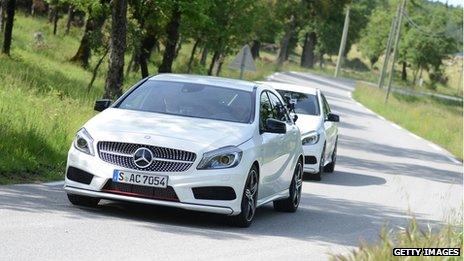Germany delays EU limit on CO2 emissions from cars
- Published

Exports of German luxury cars are still booming
The German government has persuaded its EU partners to delay introducing new limits on CO2 emissions from cars.
Environment ministers agreed to revise a deal, reached in July, that set a limit of 95g per km for the average car. That target for CO2 emissions was to take effect in 2020.
But Germany, famous for its high-performance cars, says the 95g limit should not take full effect until 2024.
Green activists deplored the new delay as a "shameful sop" to polluters.
A leading German Green Party MEP, Rebecca Harms, accused Germany's Chancellor Angela Merkel of "riding roughshod" over the EU's democratic process, because the 2020 agreement had already been reached between the European Parliament and the Council - the EU ministerial grouping.
"Weakening the agreed 2020 limits, which have long been known, is a shameful sop to German car manufacturers and will slow the development of new technologies to deliver more efficient and less polluting cars," Ms Harms said after the ministers' vote.
Chancellor Merkel's conservative Christian Democrats (CDU) are holding talks with the Greens on Tuesday on the possibilities of forming a coalition government. But many analysts believe a "grand" coalition between the CDU and the centre-left Social Democrats (SPD) is more likely to emerge.
Call for 'flexibility'
The UK was among the countries that supported the German environment minister's position on Monday, German ARD news reports.
The German minister, Peter Altmaier, said "it's not a fight over principles but how we bind the necessary clarity in climate protection with the required flexibility and competitiveness to protect the car industry in Europe".
Correspondents say there has been intense lobbying by luxury carmakers such as BMW and Daimler, maker of Mercedes, over the EU legislation.
The emissions limits are part of the EU's drive to switch Europe to a low-carbon economy and slow the impact of climate change. There is also widespread concern about other pollutants from car exhausts.
In a new report, the European Environment Agency (EEA) says, external more than 90% of European city dwellers are exposed to the most harmful particles in air pollution - PM and O3. Often the particles are transported for long distances across borders, it says.
Under the German proposal, the 95g target for CO2 would be phased in - it would apply to 80% of cars by 2020, and then to all by 2024.
The ministers' backing for Germany means a revised plan will now be negotiated with MEPs and the European Commission, and a deal may not be reached until after the May 2014 European elections.
EU Climate Commissioner Connie Hedegaard said she was disappointed and rejected the German proposal, Reuters news agency reported.
Critics say the delay will undermine investment in greener alternatives, like electric cars and more fuel-efficient engines.
- Published18 March 2013
- Published14 March 2013
- Published16 May 2013